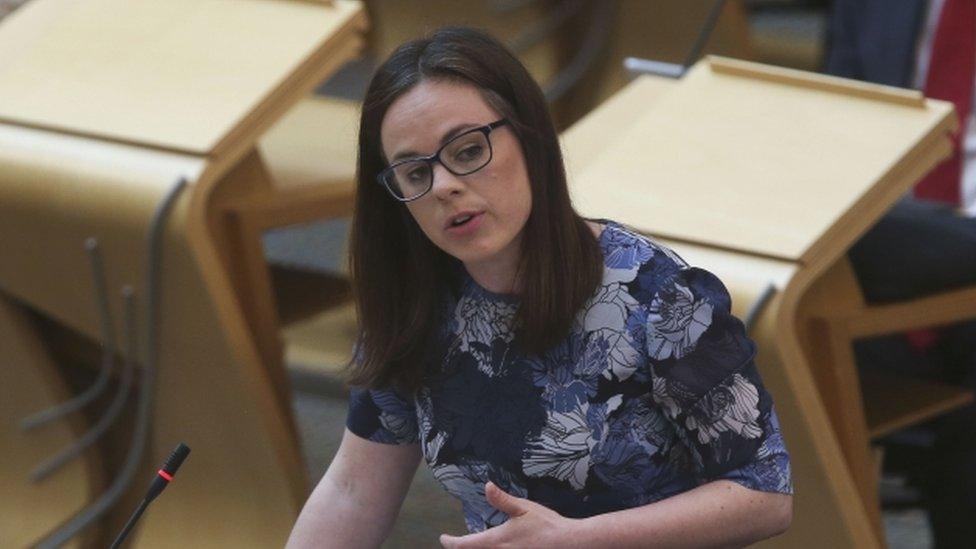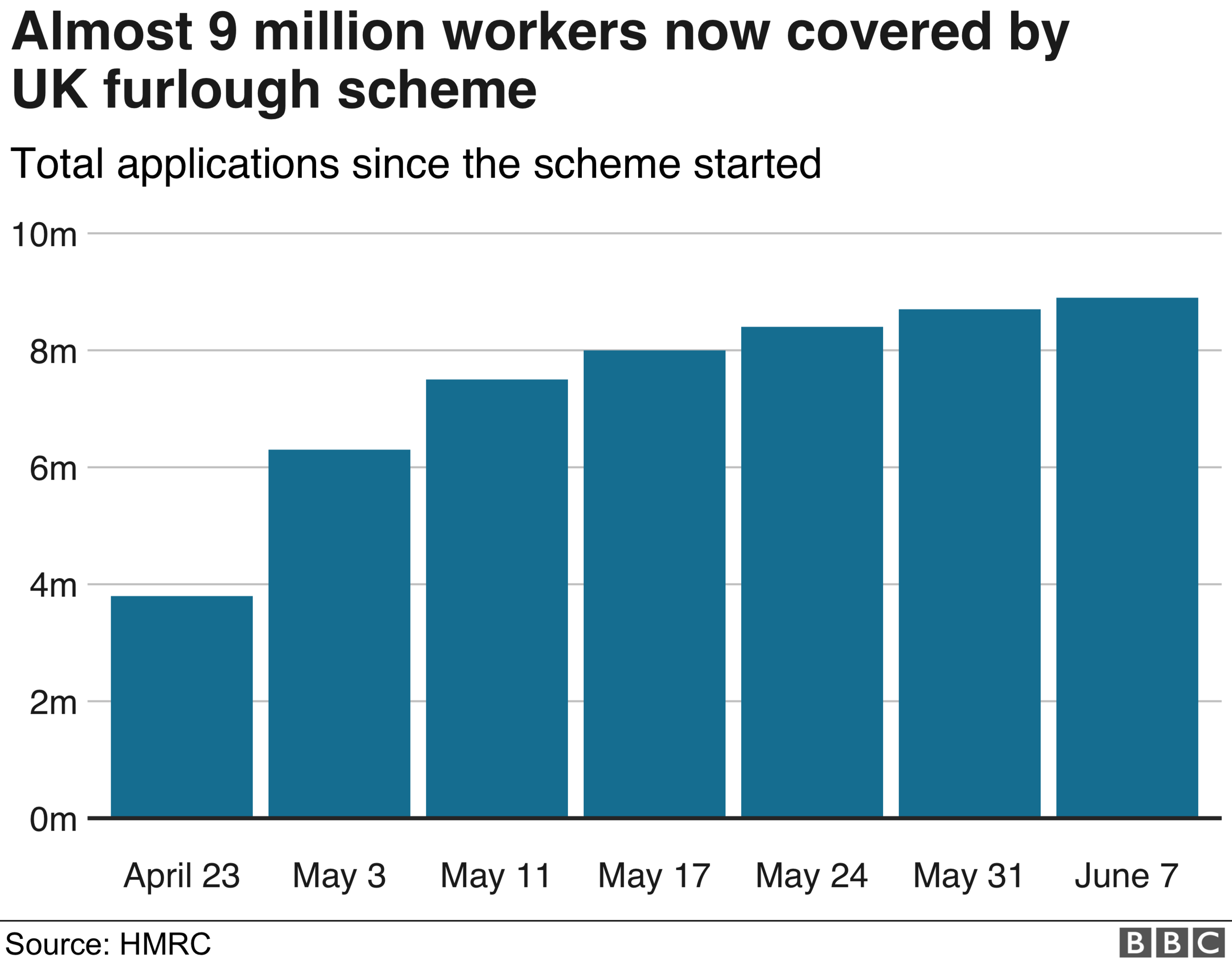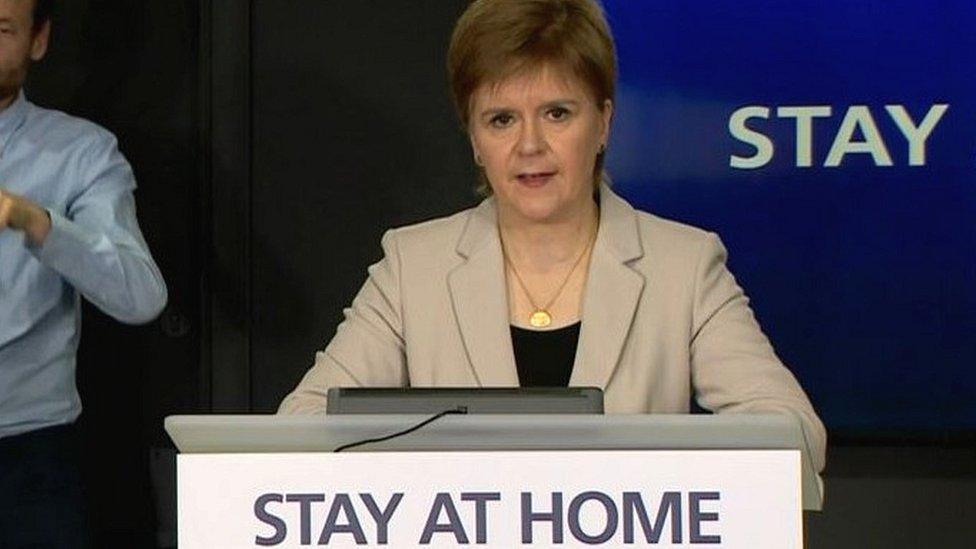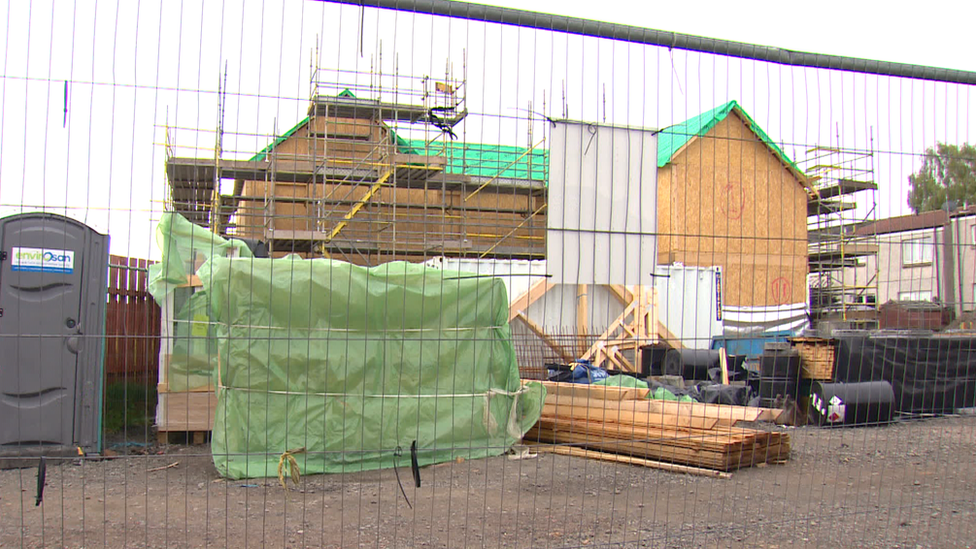How will Scotland's economy work after coronavirus?
- Published

Kate Forbes said things were going to be really difficult
With the coronavirus infection rate falling and lockdown measures starting to ease, attention is turning to the economic impact of the pandemic and the threat to jobs and businesses.
Finance Secretary Kate Forbes spoke to the BBC's Podlitical podcast about the risks of a "disproportionate" impact on Scotland's economy, the "acute hardship" facing firms and how to persuade people to return to shops and restaurants.

Gradual recovery
Ms Forbes wants to be frank with people that there are difficult times ahead, saying that "things are going to be really difficult".
She said: "Business owners are facing acute hardship right now, we know the unemployment rate is likely to increase - we'll do everything we can to support business but it is going to be enormously challenging."
And she said that even as the immediate crisis waned, "things are not going to get much better".
She said: "I think even with additional certainty for certain sectors being able to open, we're also starting to see more redundancies and more major businesses having to let people go.
"I think the impact is going to be with us for quite a long time. it's not just about getting through this acute few months, but actually figuring out how we support the economy for a much longer period of time.
"People talk about graphs, they talk about a V-shaped graph which means economic output plummeted during the crisis but will bounce back as we come out and get businesses trading again.
"But there's evidence now that it will be a more gradual recovery, which means economic output might not recover to the pre-crisis level until the start of 2023."

Restoring confidence

Will people want to quickly return to bars and restaurants when they do open?
The Scottish government is moving out of lockdown "carefully and cautiously". But has the "stay at home" message been so effective that people will be wary about returning to workplaces and businesses?
Ms Forbes said the economy has to be restarted "at a pace the country is comfortable with" with the best scientific evidence in mind. She said that while tourism businesses in rural areas will be keen to reopen, local residents may still be "nervous about an influx of visitors".
She said: "How do we give people confidence and hope that's based on truth, and honesty and evidence?
"There's no value in me glibly saying 'lets get the economy back up and running, firing on all cylinders as quickly as possible' if we don't take people with us.
"Because the customers won't go back to those shops, the markets wont return, people will not feel comfortable going back to work if that confidence is not based on fact."

'Disproportionate' impact

Will a longer lockdown mean a steeper cost in terms of the economic impact?
There are concerns that the longer Scotland remains in lockdown, the worse the financial impact will be. As the easing of measures accelerates south of the border, is there a danger of Scotland being left behind?
Asked if the fiscal impact could be more marked in Scotland, Ms Forbes said: "It certainly could be worse for slightly longer than in England because you're right in saying that shops just now are able to reopen, the housing market is slightly ahead and some construction in England continued during the pandemic.
"So yes, there is a risk of the economic impact being very disproportionate. The risk with that, for me, in balancing a budget is that it's not just about the money in people's pockets as employees - it's great that the furlough scheme has been extended to cover the different reopening dates, but it will also have a profound impact on our budget as well.
"I think a lot of the impact will be a lot more easily quantified at the end, because equally you could argue that if customers in England are not confident that things reopened at the right time they haven't actually returned.
"So we know that some industries are already trading [in England] that aren't in Scotland, but ultimately if there is a more significant return of customers or of the market in Scotland, and businesses get back up and trading quicker when they're allowed to do so, actually it might even itself out."

Social distancing

Several countries have already introduced different rules on how far you should keep apart from other people
People have become used to keeping apart - something Ms Forbes says will not be changing any time soon.
"Ultimately, until we have a vaccine the only way we have to deal with coronavirus is social distancing," she said.
"We're all going to have to adapt in the way we work, the way we spend time with one another, and the way we have fun - we're going to have to do that through social distancing."
A key piece of this strategy is the distance itself - the 2m (6ft) rule.
There have been calls from businesses and some politicians to relax this rule, with the World Health Organisation suggesting a 1m (3ft) distance which is currently in use in countries such as France.
Ms Forbes said that while the matter remains under review, "at the moment the evidence we are basing our decisions on is that 2m is significantly preferable to 1m".
She added: "We need to make sure we are following the best evidence in order to save lives and reduce transmission, and that is what will give customers the confidence to return to the shops and the pubs."

The role of government

The UK government's "job retention" furlough scheme has been extended until the end of October
The response to the pandemic has seen unprecedented levels of state involvement in the lives of people in the UK, with the government now paying the wages of a quarter of the workforce.
Ms Forbes said the response to the crisis had probably changed how she sees the role of government.
She said: "My view going forward is that there has to be some sort of national endeavour. Businesses and government should be working together far more closely than we have.
"There's been a bit of a culture where it's government does things to business and business grumbles and gets on with it - that has to change.
"There is no public sector without a thriving private sector. That private sector though has to look after its employees, and make sure they're not on fragile contracts.
"My thinking going forward is that I don't think we should be increasing the tax burden at a time like this at all, but I do think some of the expectations that government has of business need to be clearer in coming out of this pandemic.
"I keep hearing this point about doing thing differently, about how we want to take advantage of this moment to reposition the economy to make it a fairer society, but actually that's going to require quite significant levels of government intervention and a sense of national endeavour where everyone is playing their part."

Radical changes

Ms Forbes - a former digital economy minister - wants to see "far more" done on the use of technology
Ms Forbes has only been finance secretary for a short time, but taking the reins at a pivotal moment means she can envisage radical changes to the economy in the coming years.
She said: "I hope in 10 years time there's people in my role just now discussing that the reason why Scotland is such a prosperous, thriving growing economy is because of decisions that were taken in the aftermath of a pandemic in 2020 to reposition our economy and to support the industries that will really grow and take us into the future."
In particular, Ms Forbes wants to see a digital revolution making the most of new technology and artificial intelligence that could help solve the way "economic output is unfairly distributed across Scotland".
She said: "We are not making the most of how we use technology. We are a small country of 5 million people with a global market out there that means you can access that from the smallest island in Scotland in the same way as you can in the middle of London. I think we need to do far more on that."

How do we get there?
The finance secretary highlighted three key ways the government wants to help move to this radical future.
The most "obvious" is investment, giving financial support to businesses to invest in new equipment.
The second is education, with universities and colleges under "extreme pressure" and facing "significant" changes to their student base.
Ms Forbes said: "If we're going to be investing in universities to replace their lost grant funding we have choices about what we prioritise, and we're going to have to produce the skills and talent that can work in these businesses and support these industries."
The third element of the finance secretary's plan is to help industries "refocus".
"The oil and gas industry is a pretty good example where we know we need to change, we need to transition," she said.
"If we're going to be significantly investing in those industries then we need to be clear about what the output is that we want, and it can't just be business as normal."

- Published11 June 2020

- Published11 June 2020
